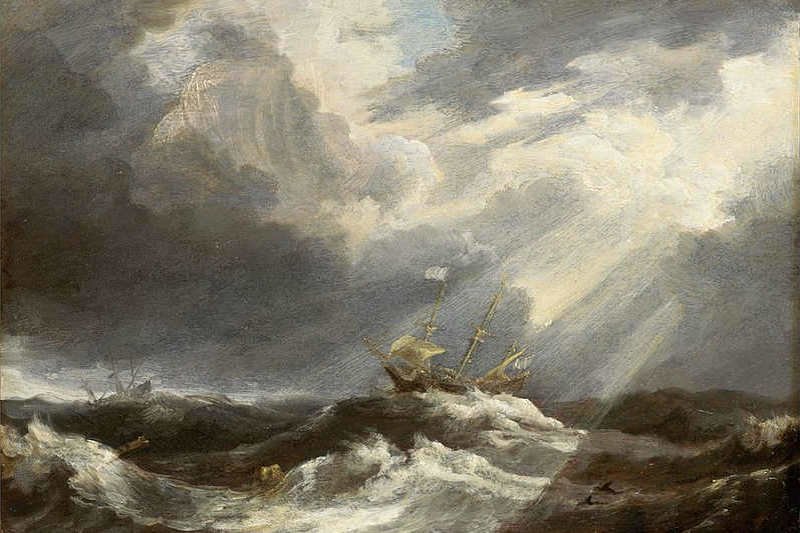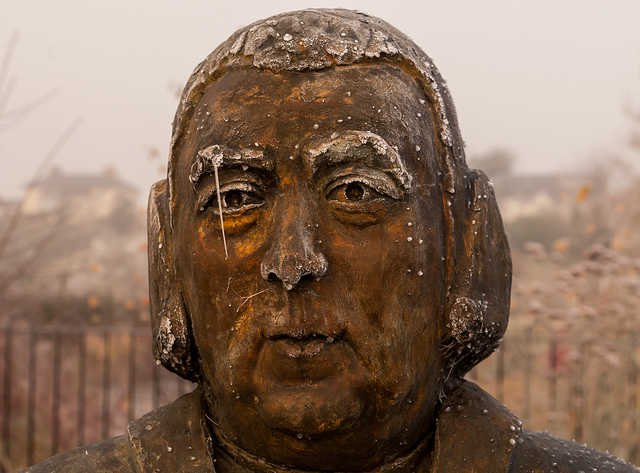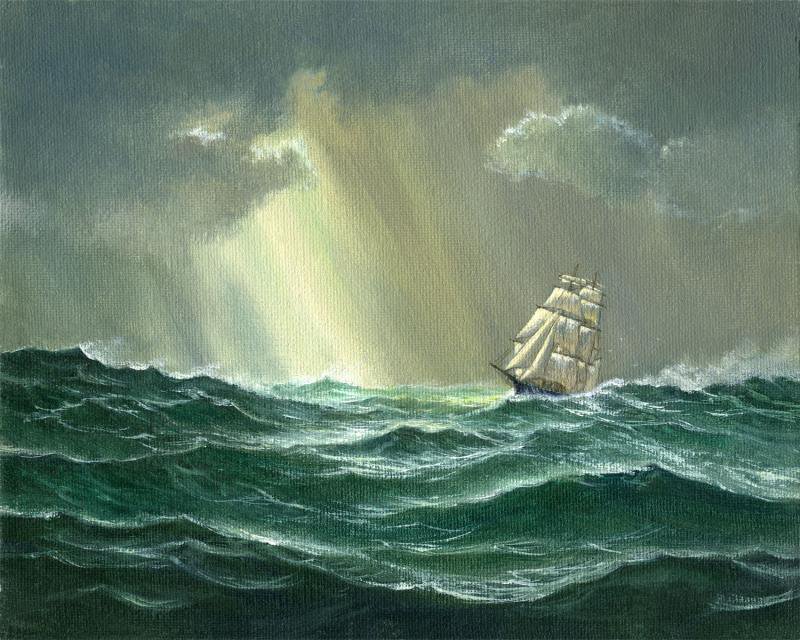
There’s hardly a hymn today better known than John Newton’s Amazing Grace. It’s sung by religious and secular singers alike, though few secular singers understand how profound the lyrics are. And it is quite possible that we who are Christians also fail in important ways to appreciate what John Newton (1725-1807) was saying in this hymn.
Let’s look at it with some care to see what we can find out, but first, a word about Newton’s story, which we’ll see is also captured in the words of the hymn. Above is an artist’s conception of the storm and the ship in which John Newton was caught. This ship was not a “slaver,” but Newton had been involved deeply in the slave trade. After a traumatic experience in which he was himself a slave in Africa, he was rescued and was returning to England on the merchant ship Greyhound. During the voyage the ship encountered a great storm and was nearly lost. It was during the worst hours of the storm that John Newton began to review his own life and to pray for God's mercy, after which the storm began to die down. This experience marked the beginning of his conversion to Christianity and the beginning of his understanding God’s grace.
Amazing grace! (how sweet the sound)
That sav'd a wretch like me!
I once was lost, but now am found,
Was blind, but now I see.
What is grace? One theologian showed its importance this way: “The very center and core of the whole Bible is the doctrine of the grace of God.” But this still doesn’t tell us what it is. Another writer has defined it: “Grace is the love of God shown to the unlovely.” Another definition is “God’s favor toward the unworthy” or “God’s benevolence on the undeserving.” But in the Bible and in human experience, what does this grace do? In His grace, God is willing to forgive us and bless us, even though we fall far short of being who God made us to be and who we ought to be.
The English term “grace” found in the Bible is taken from the Greek term, charis, which occurs in the New Testament about 150 times—so we see it’s an important word! Here’s one place it’s used—in Paul’s Epistle to Titus: “For the grace of God has appeared, bringing salvation for all people,” (2:11). This is actually a reference to Jesus Christ; His appearing, His coming into the world, was a supreme act of grace. But again, What is grace? It is God reaching out to bring lost people back to Himself, people who had no merit, no deserving at all, attached to themselves, since they were—and we are—all really wretched rebels against God and inveterate, life-long sinners. One can be a rebel against God in all sorts of ways, but in the end it comes down to making something or someone besides God the mainspring of our lives—worshipping some idol or another. It may not be a statue or metal image—it probably won’t be. Instead, it will be a preoccupation, a way of thinking and behaving that shows us to have made something besides God the main object of our concerns, our time, our love, our being in this world.
Sometimes we make this “idol” our own sense of our own goodness; it’s a worship of our own sense of being able to save ourselves—it’s almost as though we are our own gods, but we want God to okay this. Thus we determine to do good things and then feel that God owes us because we’ve been so good at doing good deeds. But this is a delusion, for all these good deeds are really only “fig leaves,” that is, attempts to cover up our failure to really love God.
But how can we ever then truly please God? By means of our good deeds we cannot—but once we have received His gracious love in Christ, then we do good deeds not to earn His approval but to demonstrate our love and gratitude for what He’s done for us. We cannot save ourselves by means of our deeds, but our deeds are how we can tell God we love Him. Another passage in Paul’s Epistle to Titus helps us to understand grace further:
Not by works of righteousness which we have done, but according to his mercy he saved us, by the washing of regeneration, and renewing of the Holy Ghost; which he shed on us abundantly through Jesus Christ our Savior; that being justified by his grace, we should be made heirs according to the hope of eternal life. (Titus 3:5-7, KJV)
Not by our efforts, but by His mercy He saves us. Here we see the term mercy introduced almost as a synonym for grace, though they are not the same—but some people fairly argue they are two sides of the same coin—that of God’s love. Here’s one commentator’s remarks on the subject:
The Greek word used for mercy is most often eleos (pity, compassion) and for grace is charis (favor). Mercy and grace can be differentiated as follows: mercy is the act of withholding deserved punishment, while grace is the act of endowing unmerited favor. In His mercy, God does not give us punishment we deserve, namely hell; while in His grace, God gives us the gift we do not deserve, namely heaven….mercy is a compassionate love to the weak, and grace is a generous love to the unworthy. Humans are weak and unworthy – we all need God’s mercy and grace. Mercy takes us to the path of forgiveness, while grace leads us to reconciliation.
And the gift of God given by grace is not just heaven, but the king of heaven, that is, Jesus; he’s given us above all to be our savior, king, friend and Lord forever. As the Gospel of John puts it, “For the law was given by Moses, but grace and truth came by Jesus Christ” (John 1:17). Now what is it about grace that is “amazing?” We know that the word “amazing” is used for the most banal things nowadays—“that was an amazing meal”—so that its real meaning is obscured, but its true meaning is “causing great surprise or wonder; astonishing.” It has to do with wonder.

Statue of John Newton in winter. It’s found in County Donegal in Ireland, where Newton’s ship finally reached shore on April 8, 1748. Photo by Greg Clarke.
When John Newton’s ship was caught in a terrible storm, after hours pumping water from the floundering ship, that man cried, “If this will not do, the Lord have mercy upon us!” He was powerfully affected by what he’d just cried out. He later wrote, “This thought, spoken without much reflection, was the first desire I had breathed for mercy for many years.” This is what directly occurred to him when he said it: “What mercy can there be for me?” The next day he had many hours to brood on his own life. Newton wrote later, “I thought there never was or could be such a sinner as myself; I concluded that my sins were too great to be forgiven.” Still, for many days the ship—severely damaged—was at the mercy of the sea. He was now reading the Bible, seeking to find out if God—whom he’d rejected before—was there and cared.
John Newton, the writer of this hymn, calls himself “a wretch.” We know he was a slave trader, a man who caused other human beings immeasurable suffering, a man known to be hardened and even bitter—he truly understood himself to be wretched. But something happened to him—acute suffering of his own while at sea in a terrible storm made him reconsider his life and remember what he’d heard of the goodness of God as a very young person. And so, writing this hymn in an autobiographical mode many years after he turned to Christ, he confessed, using language from Luke’s gospel about a lost son, “I once was lost but now I’m found.” The actual text from Luke refers to the father of the prodigal son who has returned, penitent, from a life of debauchery: “For this my son was dead, and is alive again; he was lost, and is found” (Luke 15:24). And the hymn in this first stanza also refers to the account of John’s gospel about a man born blind: “I was blind but now I see.” The actual text from John is, “Then again called they the man that was blind, and said unto him, Give God the praise: we know that this man is a sinner. He answered and said, Whether he be a sinner or no, I know not: one thing I know, that, whereas I was blind, now I see” (John 9:24-25). Newton clearly identifies with these men who were lost and blind.
'Twas grace that taught my heart to fear,
And grace my fears reliev'd;
How precious did that grace appear,
The hour I first believ'd!
When he was not fearing God, what stopped him from doing whatever his heart desired, no matter what it cost others? Reflecting on that showed him he was wretched. But through the gracious interference of God Newton learned what Job knew: “Behold, the fear of the Lord, that is wisdom; And to depart from evil is understanding” (Job 28:28). But inordinate fear—dread—is not what God wants or expects from men and women, and John Newton grew to understand that. Just note how often Jesus told His disciples not to fear. When they were caught in ship in a storm on the sea and Jesus appeared to them, walking on the water, what did the Lord say?
And in the fourth watch of the night Jesus went unto them, walking on the sea. And when the disciples saw him walking on the sea, they were troubled, saying, It is a spirit; and they cried out for fear. But straightway Jesus spake unto them, saying, “Be of good cheer; it is I; be not afraid.” (Matthew 14:25-27)
The fear of the Lord is not dread, but awe and respect. In Psalm 19 the Bible says “The fear of the Lord is clean, enduring forever.” Such fear is a good thing! John Newton saw this and knew that the Lord would not have him in dread: “And grace my fears relieved.”
Thro' many dangers, toils and snares,
I have already come;
'Tis grace has brought me safe thus far,
And grace will lead me home.
This grace, this giving of unmerited favor leading us to peace with God, entirely issuing from Him and not earned by us at all, is the only way men and women come to God, and this same grace brings us along and sees us through. Seeing how lost and rebellious and unwilling we are, apart from His grace, to surrender to Him, we must give Him all our thanks if we finally do. And seeing how he does all this in love, how can we not in gratitude and wonder, love Him in return? Paul writes, “The love of Christ constrains me—it compels me” (II Corinthians 5:14). And look how the Bible assures us about this grace: “Being confident of this very thing, that he which hath begun a good work in you will perform it until the day of Jesus Christ” (Philippians 1:6). This grace which God gave to those He rescued will continue to bless and protect His own to the end.
The Lord has promis'd good to me,
His word my hope secures;
He will my shield and portion be,
As long as life endures.
The many, many promises in God’s word give us great and lasting hope that He will continue to shield us and be our inheritance—our portion—as long as we’re in this world.
Yes, when this flesh and heart shall fail,
And mortal life shall cease;
I shall possess, within the veil,
A life of joy and peace.
And yes, when our time comes to leave this present world, our ties to Him will not end. The phrase, “within the veil” refers to the veiled Holy of Holies in the ancient Jewish temple. Behind the veil was the altar with its golden top, overseen by the cherubim, all representing the real presence of God. Before the crucifixion—Christ’s offering Himself as a substitutionary atonement to pay for all our sins—no man could go within the veil except the high priest, and he only could go in once a year—and only with sacrificial blood representing that atonement. For, as the Bible says, without the shedding of blood there is no remission of sins (Leviticus 17:11; Hebrews 9:22). But Jesus, by means of His own blood, caused the ancient Jewish sacrificial system to become no longer needed, for Jesus Himself is the one true and eternal sacrifice, making it possible by what he did on the cross for all who trust in Him to become children of God (John 1:12). When He died, the veil was torn open! Those who have been blessed by God’s grace “possess within the veil” the peace and joy that comes to those who have been rescued!
The earth shall soon dissolve like snow,
The sun forbear to shine;
But God, who call'd me here below,
Will be forever mine.
Newton here refers to those things in the Bible which speak of the end of this present world. One such place is in II Peter: “But the day of the Lord will come as a thief in the night; in the which…the elements shall melt with fervent heat, the earth also and the works that are therein shall be burned up” (II Peter 3:11). The earth shall “dissolve like snow.” And yet God has not forsaken mankind nor the earth, for later on in this same passage we read, “we, according to his promise, look for new heavens and a new earth, wherein dwelleth righteousness.” We have hope in death, that it’s not the end. The apostles speak movingly of our hope in the resurrection and in eternal life, but Jesus spoke of such things first. In John 14 he said, “Let not your heart be troubled: ye believe in God, believe also in me. In my Father's house are many mansions: if it were not so, I would have told you. I go to prepare a place for you. And if I go and prepare a place for you, I will come again, and receive you unto myself; that where I am, there ye may be also” (John 14:1-3). In the Psalms is this wonderful declaration, “My flesh and my heart may fail, but God is the strength of my heart and my portion forever” (Psalm 73:26). This is the wonder of eternal life! This is the blessed hope given us by God’s amazing grace!
Amazing Grace is John Newton’s testimony, the story of his life with God—and above all the story of God’s gracious rescue when the one rescued was without hope, apart from that amazing love which reached down and drew him to Himself. As Jesus says in John’s gospel “No one can come to me unless the Father who sent me draws him. And I will raise him up on the last day” (John 6:44). It wasn’t John Newton who found God, but God who found John Newton and drew him to His Son, Jesus Christ—that’s what Amazing Grace is all about. And this is what He does with each of us—it is His grace which draws us, and no merit in ourselves. But how amazing it is, isn’t it—that God loves us that much—to send His Son and then to draw us to Him? So, no matter what storms you are in, He allows these to draw us to His Son! May we come to God all the time, though we may have been His if we’re believers for a long while. But if we’ve never come to Him before, Jesus is calling today, even now—and the Father is drawing you to His Son.
May He bless you this day!

This was written for the weekly devotional held in the Halo House chapel, a residence for patients who’ve come for treatment at M.D. Anderson Cancer Center, Houston, Texas.